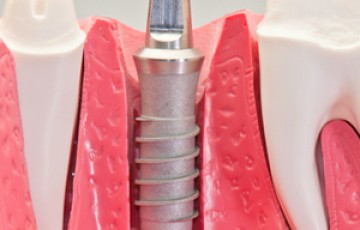
What is dental implant?
A dental implant is an artificial tooth root that is surgically anchored into your jaw to hold a replacement tooth or bridge in place. The benefit of using implants is that they don’t rely on neighboring teeth for support and they are permanent and stable. Implants are a good solution to tooth loss because they look and feel like natural teeth.
Implant material is made from different types of metallic and bone-like ceramic materials that are compatible with body tissue. There are different types of dental implants: the first is placed directly into the jaw bone, like natural tooth roots; the second is used when the jaw structure is limited, therefore, a custom-made metal framework fits directly on the existing bone.
How do they work?
Strategically placed, implants can now be used to support permanently cemented bridges, eliminating the need for a denture. The cost tends to be greater, but the implants and bridges more closely resemble real teeth.
Can anyone receive dental implants?
Talk with your dentist about whether you are an implant candidate. You must be in good health and have the proper bone structure and healthy gums for the implant to stay in place. People who are unable to wear dentures may also be good candidates. If you suffer from chronic problems, such as clenching or bruxism, or systemic diseases, such as diabetes, the success rate for implants decreases dramatically. Additionally, people who smoke or drink alcohol may not be good candidates.
What can I expect during this procedure?
The dentist must perform surgery to anchor the “artificial root” into or on your jaw bone. The procedure is done in the dental office with local anesthesia. The gum is then secured over the implant, which will remain covered until it fuses with the bone. The dentist then uncovers the implant and attaches an extension, or post, to the implant. With some implants, the implant and post are a single unit placed in the mouth during the initial surgery. Finally, the dentist makes an artificial tooth, or crown, that is attached to the implant post.
How long does the process take?
The process can take up to nine months to complete. Each patient heals differently, so times will vary. After the implant and posts are placed surgically, the healing process can take up to six months and the fitting of replacement teeth no more than two months. Sometimes, if a patient has good bone quality, posts can be placed and replacement teeth fitted in one appointment.
What is the success rate of implants?
The success rate for implants depends on the tooth’s purpose and location in the mouth, as well as a patient’s overall health.
How do I care for implants?
Poor oral hygiene is a big reason why some implants fail. It is important to floss and brush around the fixtures at least twice a day. Your dentist will give you specific instructions on how to care for your new implants. Additional cleanings of up to four times per year may be necessary to ensure that you retain healthy gums.
For more information click HERE